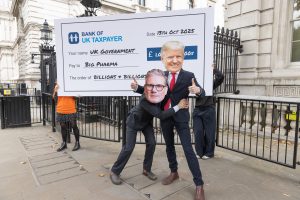
Mar 2nd, 2018
Proxy voting in parliament and transparency
By Holly Maltby
The Westminster government are looking into whether voting by proxy – (when an MP asks another MP to vote for them when they’re absent) – could be made more transparent. Right now the public have no way of finding out if an MP has asked another MP to use their vote for them. It means if an MP is away on paternity or maternity leave, or isn’t able to vote, their constituents don’t know who, if anyone, is taking their place. It means we could end up emailing our MPs asking them to vote for something when they are unable to attend for good reason, which is bad for us, and can be unfair to MPs.
The 38 Degrees team put together a short document to submit to the MPs looking into this, asking them to make the system more transparent. Here is a link to the inquiry: https://www.parliament.uk/business/committees/committees-a-z/commons-select/procedure-committee/inquiries/parliament-2017/voting-by-proxy-17-19/
If you’re interested, here is the submission below:
As a campaign organisation that mobilises people across the country to take part in democracy, 38 Degrees has an interest in contributing to this consultation. Our members (people who have taken recent actions via the 38 Degrees platform on issues they care about) rely upon transparency in Parliament and in communications with MPs. Making voting practices and records transparent will enable ordinary people to understand more about Parliament and their MP’s activity. Having a transparent proxy voting system would enable members of the public to be more empowered.
Response to terms of reference 2. ‘What the practical requirements of appointing a proxy would be: transparently communicated to the House and the public’ and 3. ‘How a proxy vote would be recorded.’
It is important for transparency that all proxy appointments and proxy votes are registered digitally and made available as open data, in line with the current system which makes data available on which MPs & Lords voted for and against an issue. This would have a number of benefits:
● Members of Parliament and their staff would be able to easily check details of their proxy, to confirm they are correct and up-to-date.
● Members of the public would be able to hold their MPs to account more fairly and effectively. For example, at present there is no simple way for members of the public to know that an MP is on long-term leave (such as maternity, sickness, etc). This can lead to situations where it appears that an MP is simply not turning up to vote on important issues, when in fact they are absent for good reasons, or may have abstained due to a ‘pairing’ agreement.
● Organisations could automatically fetch this data so their systems do not contact MPs who are on leave.
In practical terms, this data should ideally be included on the existing Data.parliament platform (http://www.data.parliament.uk), which uses the Open Parliament License to enable free use of data by members of the public & third parties. As per existing data feeds on Data.parliament, the data should ideally be made available in a variety of formats suitable both for individuals to search & view the data, but also for programs to automatically consume the data.
The data feed regarding absences should ideally include the following information:
● The MP who is on leave
● The date on which the leave starts
● Who (if anyone) is covering them during the absence, and how. For example:
○ Voting in parliament is being covered through Proxy Voting by MP Jane Smith
As well as introducing a new feed for absence data, the existing Data.parliament feed on voting data should be updated, to include the following information:
● Information about MPs who attend a vote but abstain. Differentiating abstentions from absences is important information which should be made available to the public and constituents in order to better hold their MP to account.
● Information about how a vote was cast, for example:
○ Voted in person in the house
○ Voted by proxy via MP John Smith
○ In future, this could include other means of voting, eg. e-voting if this were introduced
● Information about whether an MP on leave instructed their proxy to vote a particular way, or whether they left the voting decision to the discretion of the proxy. This would be important and useful in order to hold a proxy to account.

















